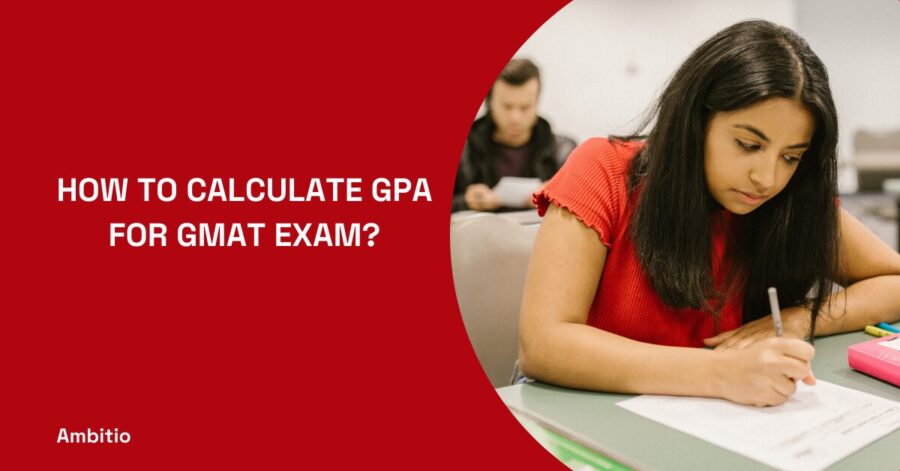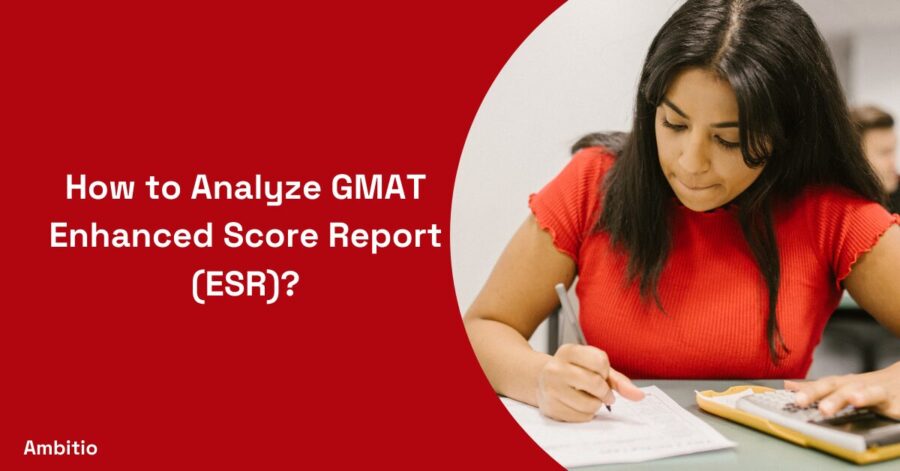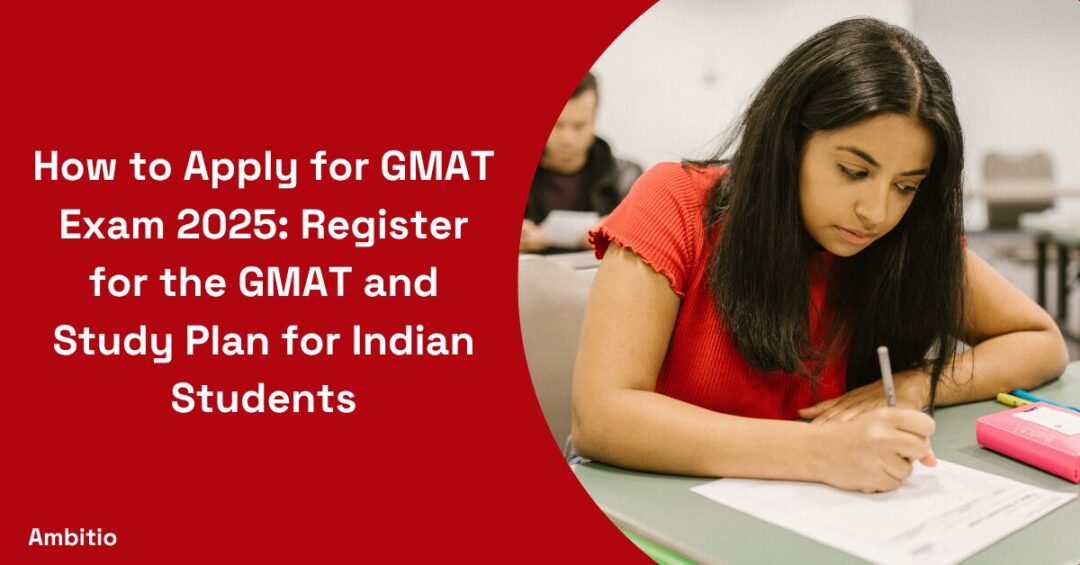2 April 2025
10 minutes read
GMAT Verbal Scoring Algorithm: Understand How the GMAT Scoring Algorithm Work

Key Takeaways
- The GMAT’s adaptive algorithm rewards consistent performance over perfect answers.
- Early questions set the stage, but it’s your entire test performance that determines your score.
- Strategic preparation and time management are as crucial as subject knowledge for GMAT success.
Did you know that the GMAT Verbal section accounts for 50% of your total GMAT score? Yet, many test-takers underestimate its complexity, focusing solely on the Quantitative section. This oversight can lead to disappointing results and shattered MBA dreams.
Decoding the GMAT Verbal scoring algorithm feels like cracking a secret code. You’ve practiced countless questions, but your scores aren’t improving. The frustration builds as you wonder what you’re missing. Is it the question types? The time management? Or is there a hidden factor in play? Understanding how the algorithm works can be the key to unlocking your true potential and achieving that coveted high score.
The GMAT Scoring Algorithm
The GMAT Focus score calculation is a complex process that considers multiple factors. Unlike traditional tests where your score is simply based on the number of questions you get right or wrong, the GMAT uses an adaptive algorithm that adjusts the difficulty level of each question based on your previous answers.
For example, two students might answer the same number of questions correctly in the Quant and Verbal sections, but receive different scores. This is because the algorithm considers not just how many questions you get right, but also the difficulty level of each question you answer. It’s usually the case that getting harder questions correct will boost your score more than easier ones. This adaptive nature is why it’s important to get the early questions right, as they can have a significant impact on the difficulty level of subsequent questions.
It’s worth noting that making mistakes in intervals rather than continuously can sometimes lead to a higher score. The GMAT’s scoring algorithm doesn’t seem to penalize occasional errors as heavily as consistent underperformance. However, it’s always best to aim to answer every question to the best of your ability.

Your GMAT Focus score is calculated based on your performance in the Quant and Verbal sections, which together affect your overall score. The Integrated Reasoning and AWA scores are reported separately and don’t directly impact your 200-800 score. Your percentile on the GMAT indicates the percentage of scores in its distribution that fall below yours.
To maximize your score, it’s crucial to develop strong verbal ability and quant skills through consistent GMAT study. Using resources like GMAT Club, online GMAT courses, and practice questions can help you prepare effectively. Taking GMATPrep tests can also give you a good indication of your potential score.
Remember, GMAT success isn’t just about getting a specific high score, but about demonstrating your readiness for the rigors of an MBA program. So while it’s important to aim for the highest score possible, don’t lose sight of the bigger picture in your preparation.
What is GMAT Verbal Section Scoring Algorithm?
Let’s explore how the GMAT Verbal scoring algorithm works through the cases of two test-takers, Alex and Sam. Both face a set of 36 questions, but their experiences differ based on their performance.
Alex starts strong, answering the first few questions correctly. The algorithm responds by presenting increasingly difficult questions. Alex struggles with some hard questions but manages to answer 28 out of 36 correctly. Many of these correct answers were to challenging questions, boosting Alex’s score significantly.
Sam, on the other hand, misses a few early questions. The algorithm adapts, offering easier questions next. Sam ends up answering 30 out of 36 questions correctly, but many were of lower difficulty. Despite getting more questions right than Alex, Sam’s final Verbal score might be lower due to the reduced difficulty level of the questions answered correctly.
Start from the basics. No topic is too small. Go thoroughly through topics like GMAT synonyms and antonyms. Keep this in mind during your GMAT verbal preparation.
GMAT AWA Scoring Algorithm
The GMAT AWA scoring algorithm differs from the adaptive nature of the Verbal and Quant sections. Unlike those sections, where the questions you see change based on your performance, the AWA presents a single question to all test-takers. There’s no “next question” or adjusting difficulty level based on how you’re doing. But keep in mind that GMAT total marks is an amalgamation of all these factors.
Instead of multiple questions, test-takers face one essay prompt. The scoring range for AWA is from 0 to 6, in half-point increments. Your essay is evaluated both by a human reader and a computerized scoring system. These two scores are then averaged for your final AWA score. If there’s a significant discrepancy between the human and computer scores, another human reader reviews the essay. This approach ensures a fair assessment of your analytical writing skills, regardless of the specific prompt you receive on test day. Also, practice GMAT test taking tips for extra efficiency in the process.
GMAT Integrated Reasoning Scoring Algorithm
The GMAT Integrated Reasoning (IR) scoring algorithm operates differently from other sections of the test. Unlike the adaptive nature of the Verbal and Quant sections, where the questions you see change based on your performance, the IR section presents a fixed set of questions to all test-takers. Use a good GMAT score calculator even during mock tests to get a clear idea of where you stand.
The IR section consists of 12 questions, each with multiple parts. Your score isn’t determined by the number of questions you get right or wrong, but by the total number of correct responses across all parts of all questions. The scores range for IR is from 1 to 8, in whole-point increments. There’s no penalty for wrong answers, so test-takers are encouraged to answer every question. This scoring method means that partial credit is possible – getting some parts of a question correct contributes to your overall score, even if you don’t nail every component of that particular question. Do a lot of GMAT test series and choose a good GMAT test guide.
GMAT Quant Scoring Algorithm
The GMAT Quant scoring algorithm operates on a similar adaptive principle to the Verbal section. As test-takers progress through the 31 questions in this section, the difficulty level of the questions they see adjusts based on their performance. Choose a reliable GMAT course to help you with the process.
If a test-taker answers a question correctly, the next question is likely to be more challenging. Conversely, an incorrect answer may lead to a slightly easier question. This dynamic process continues throughout the section. The algorithm doesn’t just count the number of questions correct, but also considers the difficulty level of each question answered correctly or incorrectly. Keep all of these points in mind while deciding your GMAT preparation time.
For example, two test-takers might both answer 20 out of 31 questions correctly. However, if one consistently answered harder questions correctly, they would likely receive a higher scaled score. The Quant scores range from 6 to 51, with this score contributing significantly to the overall GMAT score. Understanding this adaptive nature of GMAT questions can help test-takers develop strategies to maximize their performance during the test.
How is a GMAT Focus Score Calculated?
The GMAT Focus score calculation is a complex process that considers multiple factors. Unlike traditional tests where your score is simply based on the number of questions you get right or wrong, the GMAT uses an adaptive algorithm that adjusts the difficulty level of each question based on your previous answers.

For example, two students might answer the same number of questions correctly in the Quant and Verbal sections, but receive different scores. This is because the algorithm considers not just how many questions you get right, but also the difficulty level of each question you answer. It’s usually the case that getting harder questions correct will boost your score more than easier ones. This adaptive nature is why it’s important to get the early questions right, as they can have a significant impact on the difficulty level of subsequent questions. If you are planning to score 750 or above in GMAT, then you need to take things to the next level.
It’s worth noting that making mistakes in intervals rather than continuously can sometimes lead to a higher score. The GMAT’s scoring algorithm doesn’t seem to penalize occasional errors as heavily as consistent underperformance. However, it’s always best to aim to answer every question to the best of your ability. Understand the importance of GMAT exam and proceed accordingly.
Your GMAT Focus score is calculated based on your performance in the Quant and Verbal sections, which together affect your overall score. The Integrated Reasoning and AWA scores are reported separately and don’t directly impact your 200-800 score. Your percentile on the GMAT indicates the percentage of scores in its distribution that fall below yours. Understand GMAT exam is for what purpose and proceed accordingly.
To maximize your score, it’s crucial to develop strong verbal ability and quant skills through consistent GMAT study. Using resources like GMAT Club, online GMAT courses, and practice questions can help you prepare effectively. Taking GMATPrep tests can also give you a good indication of your potential score.
Remember, GMAT success isn’t just about getting a specific high score, but about demonstrating your readiness for the rigors of an MBA program. So while it’s important to aim for the highest score possible, don’t lose sight of the bigger picture in your preparation.
What is a good GMAT score?
What’s a good GMAT score? Well, that’s like asking how long a piece of string is – it depends! It also depends on the type of colleges accepting a GMAT score.
Imagine you’re a student tackling GMAT questions. You breeze through ten questions, nailing each one. Feeling confident? Hold up! The score isn’t just about getting questions right. It’s a complex dance between difficulty level, question types, and your performance across each GMAT section.
Here’s the kicker: your score is the percentage of test-takers you’ve outperformed. So, a “good” score? It’s specific to your goals.
Let’s flip the script. Instead of fixating on a magic number, consider this:
- Are you crushing those tricky verbal questions?
- Do you sail through each difficulty level question with ease?
- How do you fare in the quant section compared to verbal?
Remember, the GMAT is adaptive. Nail a tough question, and the next one might be even tougher. It’s like a game of academic chess! This is why you have to choose the right GMAT books for the purpose.
So, what’s good? It’s when your score opens doors to your dream schools. And that is as unique as your fingerprint.
Scoring on GMAT is Different than a Linear Test
Picture this: two students, Alex and Zoe, both answered 30 out of 40 GMAT questions correctly. Same score, right? Not so fast!
In a linear test, they’d be neck and neck. But the GMAT? It’s a whole different ball game. Here’s why:
Alex breezed through the first ten questions, triggering a barrage of high-difficulty level questions. Despite stumbling on some, Alex’s correct answers on these tough nuts boosted the score significantly.
Zoe, on the other hand, got a few questions wrong early on. The test adapted, serving up easier questions. Zoe answered more correctly overall, but many were lower-difficulty verbal questions.
Plot twist: Alex scores higher than Zoe! Why? The GMAT’s scoring algorithm isn’t just tallying right answers. It’s weighing the difficulty of each question you get right (or wrong).
So, next time you’re puzzling over GMAT questions, remember: it’s not just about how many you get right. It’s about tackling those high-difficulty questions head-on. The GMAT rewards the brave! Also, be judicial while starting your GMAT prep. Start with a GMAT beginners guide to keep things simple.
The Importance of First 10-15 Questions in GMAT
Think of the first 10-15 GMAT questions as your opening gambit in a high-stakes chess match. They’re crucial, but not for the reasons you might expect.
Myth buster: These questions don’t “set” your score. But they do something equally powerful – they set the stage.
Here’s the deal:
- Nail these early questions, and you’re fast-tracked to the tough stuff. The algorithm thinks, “This student’s got chops!” and serves up challenging verbal questions and mind-bending quant problems.
- Stumble early, and you might find yourself in the shallow end of the question pool. Easier questions = lower potential score ceiling.
But here’s the twist: A student who aces the first ten questions isn’t guaranteed a top score. Likewise, getting a few wrong doesn’t doom you to mediocrity.
The GMAT is a marathon, not a sprint. Those initial questions are your warm-up lap. They determine your starting position, but it’s your performance throughout the entire GMAT section that counts. Also, make sure to manage your GMAT time.
So, approach those early questions with confidence, but don’t let them psych you out. Remember, every question is an opportunity to show the test what you’re made of. The GMAT rewards consistency and resilience just as much as initial brilliance.
3 Things you Need to Avoid while Taking the GMAT
Understanding the GMAT is like defusing a bomb – one wrong move and boom! Here are three landmines you need to sidestep:
The Time Trap
Don’t get stuck in quicksand! Spending too long on tough GMAT questions is like throwing away points. Remember, the test adapts. If you can’t crack a difficulty level question in a reasonable time, make an educated guess and move on. Your future self will thank you when you’re not rushing through the last ten questions in a panic.
The Guessing Game
Playing eeny, meeny, miny, moe with verbal questions? Bad idea! Random guessing is like shooting yourself in the foot. The GMAT’s scoring algorithm is too smart for that. Instead, use elimination strategies. Even if you’re unsure, an educated guess is better than a shot in the dark.
The Perfection Obsession Newsflash
You don’t need to ace every question to get a stellar score. The GMAT section scores aren’t just about right or wrong – they’re about the difficulty of the questions you tackle. Obsessing over perfection can lead to anxiety, time mismanagement, and ironically, a lower score. Remember, it’s okay if a student gets some questions wrong. It’s part of the game!
Avoiding these pitfalls won’t guarantee you’ll get every question right, but it will help you navigate the GMAT’s tricky waters more effectively. Now go forth and conquer those GMAT questions like the test-taking ninja you are!
The Right GMAT Study Strategy for Better Accuracy & Faster Output
Ready to turbocharge your GMAT prep? Let’s dive into a study strategy that’ll boost your accuracy and speed faster than you can say “adaptive algorithm”!
Quality Over Quantity
Forget solving endless GMAT questions. Focus on understanding each question type inside out. Analyze ten questions deeply rather than breezing through fifty.
Time Yourself, Always
Every practice session is a mini GMAT section. Use a timer religiously. It’ll help you develop that sixth sense for pacing.
Embrace the ‘Why’
Don’t just celebrate getting a question right. Ask yourself why the correct answer is correct and why the others are wrong. This approach sharpens your verbal ability and quant skills simultaneously.
Mix It Up
Alternate between easy, medium, and high difficulty level questions. Remember, the real test is adaptive. Your practice should be too!
Review Like a Pro
Spend as much time reviewing as you do solving. Create an error log. Understand your mistakes. The GMAT rewards those who learn from their errors.
Simulate Test Conditions
Regular full-length practice tests are your secret weapon. They build stamina and familiarize you with the test’s adaptive nature.
Focus on Weak Areas
Struggling with verbal questions? Don’t shy away. Dive deeper. The biggest score improvements often come from conquering your weaknesses.
The GMAT isn’t just testing your knowledge; it’s testing your ability to think critically under pressure. This strategy helps you build both skills and confidence. Now go show that GMAT who’s boss!
Conclusion
Cracking the GMAT scoring code isn’t about gaming the system—it’s about understanding the game. This adaptive test is as much a measure of your resilience as your knowledge. So, embrace the challenge. Let each question be a stepping stone, not a stumbling block. Remember, the algorithm may be complex, but your goal is simple: showcase your best self, question by question. Now, armed with insight and strategy, you’re ready to face the GMAT not just as a test-taker, but as a problem-solver. Go make that algorithm work for you!
Elevate your GMAT performance to new heights with Ambitio’s advanced preparation platform. Our holistic approach to GMAT prep ensures you have the knowledge, skills, and strategy to excel on every section of the exam, propelling you toward your target business school with confidence.
FAQs
Does getting the first few questions right guarantee a high score?
Not necessarily. While early performance is important, the GMAT considers your entire test performance.
How does the GMAT determine question difficulty?
The GMAT uses a complex algorithm based on historical performance data to classify question difficulty.
Can I skip hard questions and still get a good score?
It’s better to attempt all questions. Educated guesses on difficult items are preferable to leaving questions unanswered.
How much does the AWA section affect my overall GMAT score?
The AWA score is reported separately and doesn’t directly impact your 200-800 score.
Is it possible to figure out how well I’m doing during the test?
Due to the adaptive nature of the test, it’s difficult to gauge your performance accurately while testing.
How many questions can I get wrong and still score 700+?
There’s no fixed number. Your score depends on the difficulty of questions answered correctly, not just the quantity.
Should I focus more on speed or accuracy in my GMAT prep?
Aim for a balance. Practice to improve both speed and accuracy, as both are crucial for a high GMAT score.

You can study at top universities worldwide!
Get expert tips and tricks to get into top universities with a free expert session.
Book Your Free 30-Minute Session Now! Book a call now




























